

2nd UNWTO Report on Gastronomy Tourism: sustainability and gastronomy
A major component of history, tradition and identity, gastronomy has also become a major motivation to visit a destination. According to the 2nd UNWTO Report on Gastronomy Tourism, this tourism segment “offers enormous potential in stimulating local, regional and national economies and enhancing sustainability and inclusion”. The Report was presented in the recent 3rd UNWTO World Forum on Gastronomy Tourism, held in San Sebastian, Spain in cooperation with the Basque Culinary Center.
Sixteen good practices in Gastronomy Tourism from different countries are showcased in the 2nd UNWTO Report on Gastronomy Tourism, touching on issues such as seasonality, training and innovation, ICT-related initiatives and wine-related itineraries. The publication stresses that in terms of tourist motivations, experiencing gastronomy is now at a similar level to visiting a museum, enjoying music and admiring the architecture of a destination. In this sense, gastronomy tourism has strong potential to improve destination management, promote cultures and contribute to other sectors such as agriculture and food manufacturing.
The commitment of gastronomy tourism towards the principles of sustainability has been one of the conclusions of the Forum held in San Sebastian. This includes areas such as poverty reduction, efficient use of resources, environmental protection and climate change, and the protection of cultural values, heritage and diversity.
The event was attended by around 250 participants from 60 countries and was inaugurated by UNWTO Secretary-General Taleb Rifai, Eneko Goia, Mayor of the City of San Sebastian, and the Director of the Basque Culinary Center, Joxe Mari Aizega.
The engagement of the traveller in these principles through his/her gastronomic experience was also underlined throughout the Forum. The need to develop appropriate policy measures and a strong governance framework was highlighted as a major conclusion. This would facilitate not only the commitment of relevant actors, but also the interaction among them, as well as the development of private-public partnerships.
The union between gastronomy and tourism provides therefore a platform to revitalize cultures, to preserve tangible and intangible heritage, to empower communities and to enhance intercultural understanding. These aspects were particularly tackled during the practical experiences included in the Forum, such as a cooking class and farm-to-table dining experiences.

UNWTO High Level Task Force Meeting on Tourism and Security convenes in Madrid
The integration of national security with tourism security, crisis communication and travel advisories were some of the key issues discussed at the 1st Meeting of the High Level Task Force on Tourism and Security, organized by the World Tourism Organization (UNWTO) today in Madrid. The event took place ahead of the 105th UNWTO Executive Council meeting to be held in Madrid, home of the UNWTO Headquarters, on 11 and 12 May.
The Task Force Meeting gathered representatives from UNWTO Member States, UN organizations such as the United Nations Office on Drugs and Crime (UNODC), and private sector entities such as the International Air Transport Association (IATA), the Pacific Asia Travel Association (PATA), the World Travel and Tourism Council (WTTC), the Federal Association of the German Tourism Industry (BTW) and the Association of British Travel Agencies (ABTA).
“The Task Force was established by the UNWTO Executive Council to help us reinforce our action and cooperation towards safer, more secure and yet more seamless travel,” recalled UNWTO Secretary-General, Taleb Rifai, opening the meeting.
Actions such as joint police work between Spain and source markets for specific events or times of the year, tourism training for security forces in Jamaica, the tourism and security task force in Kenya, and the experience of the tourism police in Thailand were some of the cases shared during the meeting by UNWTO Member States.
Also on the table were issues of public and private sector cooperation in operational crisis management and communications, and the tourism sector addressing possible tightening of security measures.
The work of the Task Force will focus on five key issues: 1) the integration between tourism and security; 2) support to the sector in setting crisis management plans and protocols; 3) travel advisories; 4) safe, secure and seamless travel including visa facilitation; and 5) crisis communications.
These areas will be addressed by specific working groups tasked with developing recommendations and guidelines to be presented at the UNWTO General Assembly.
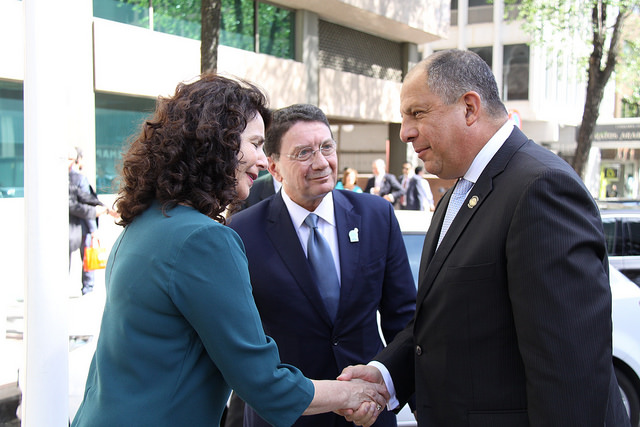
UNWTO names President of Costa Rica as Special Ambassador of the International Year of Sustainable Tourism for Development
As part of the observance of the International Year of Sustainable Tourism for Development, the World Tourism Organization (UNWTO), which is leading the campaign, has named Costa Rican President Luis Guillermo Solís Rivera as Special Ambassador of this important global action. The initiatives developed by Costa Rica in the field of sustainable tourism as well as its international positioning and momentum in this field are some of the factors behind the designation.
Traditionally considered an example of environmental commitment, Costa Rica is home to 5% of the world’s biodiversity. In addition, more than 25% of the country’s land area is classified as protected, and the country is already being powered 100% with renewable energy. One of the most outstanding initiatives carried out by Costa Rica has been the creation of the Certification for Tourism Sustainability. The programme, designed by the Costa Rican Tourism Institute, categorizes and differentiates tourism companies based on their environmental commitment.
“This recognition for Costa Rica bears witness to our emphasis on this non-smokestack industry. It also allows us to strengthen our drive to encourage more women to lead sustainable tourism projects for their economic empowerment,” said Luis Guillermo Solís Rivera, President of the Republic of Costa Rica.
“The International Year of Sustainable Tourism for Development is a unique opportunity to promote common action, but also to underline efforts in this field; and Costa Rica’s contribution to global sustainability is one of the best examples to follow. We are very grateful to President Solís for his support and leadership in advancing tourism as a tool for sustainable development,” explained UNWTO Secretary-General Taleb Rifai.
The International Year of Sustainable Tourism for Development marks an important milestone in the 2030 Agenda and in the progress towards the achievement of the Sustainable Development Goals, in which the tourism sector appears as a key tool. The figure of Special Ambassadors is aimed at providing a global focus to the International Year, as well as to highlight the commitment of leaders and prominent personalities in the development of sustainable practices in the tourism sector.
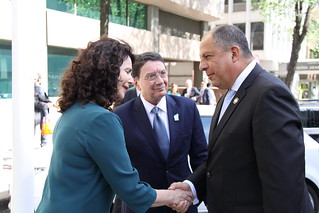
The list of Special Ambassadors consists of:
– Tuilaepa Sailele Malielegaoi, Prime Minister of Samoa
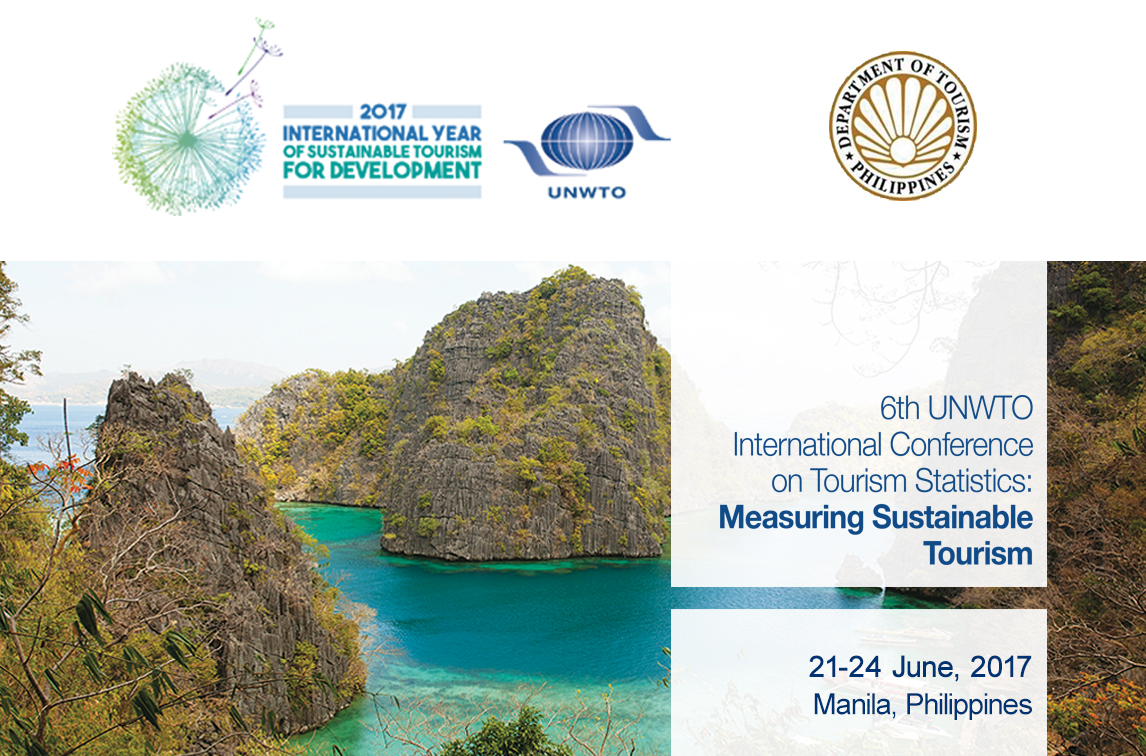
The Philippines will host the 6th UNWTO Conference on Tourism Statistics
Policy leaders, statisticians, academicians and private sector will convene in Manila, The Philippines, next June 2017 (21-24), to discuss new methodologies to measure the full impacts of tourism. The 6th edition of the World Tourism Organization (UNWTO) International Conference on Statistics, an official event of the International Year of Sustainable Tourism for Development 2017, will address the topic of ‘Measuring Sustainable Tourism’.
Supported by the United Nations Statistics Division, the UNWTO initiative ‘Towards a Statistical Framework for Measuring Sustainable Tourism’ (MST) underlines the need to measure the full effects of the tourism sector. The UNWTO International Conference to be held in Manila will serve as a platform to discuss the first draft of the MST framework and its future implementation.
The Philippines has become a reference in the region with regard to tourism measurement and a role model in the development of effective inter-institutional collaboration to develop tourism statistics. The commitment of the country, shown in the development of the Tourism Satellite Account framework, explains the decision to host the discussion on the MST initiative.
A Ministerial Roundtable will inaugurate the Conference in order to align efforts to advocate among governments the relevance of integrated and reliable data to manage and promote a more sustainable tourism sector. Afterwards, a Panel of Statistical Institutes will provide the opportunity to share experiences and practices implemented at global, regional and national level.
Other technical sessions will focus on understanding data demands, the link between the economic, the environmental and the social dimensions of sustainable tourism, including job creation, sub-national measurement, Sustainable Development Goals (SDGs) indicators, and data sources including big data.
Besides policy leaders, statistical experts and private sector, representatives from international organizations such as the International Labor Organization (ILO), the Organization for Economic Co-operation and Development (OECD), the United Nations Statistics Division (UNSD) and Eurostat will also contribute to the discussions.
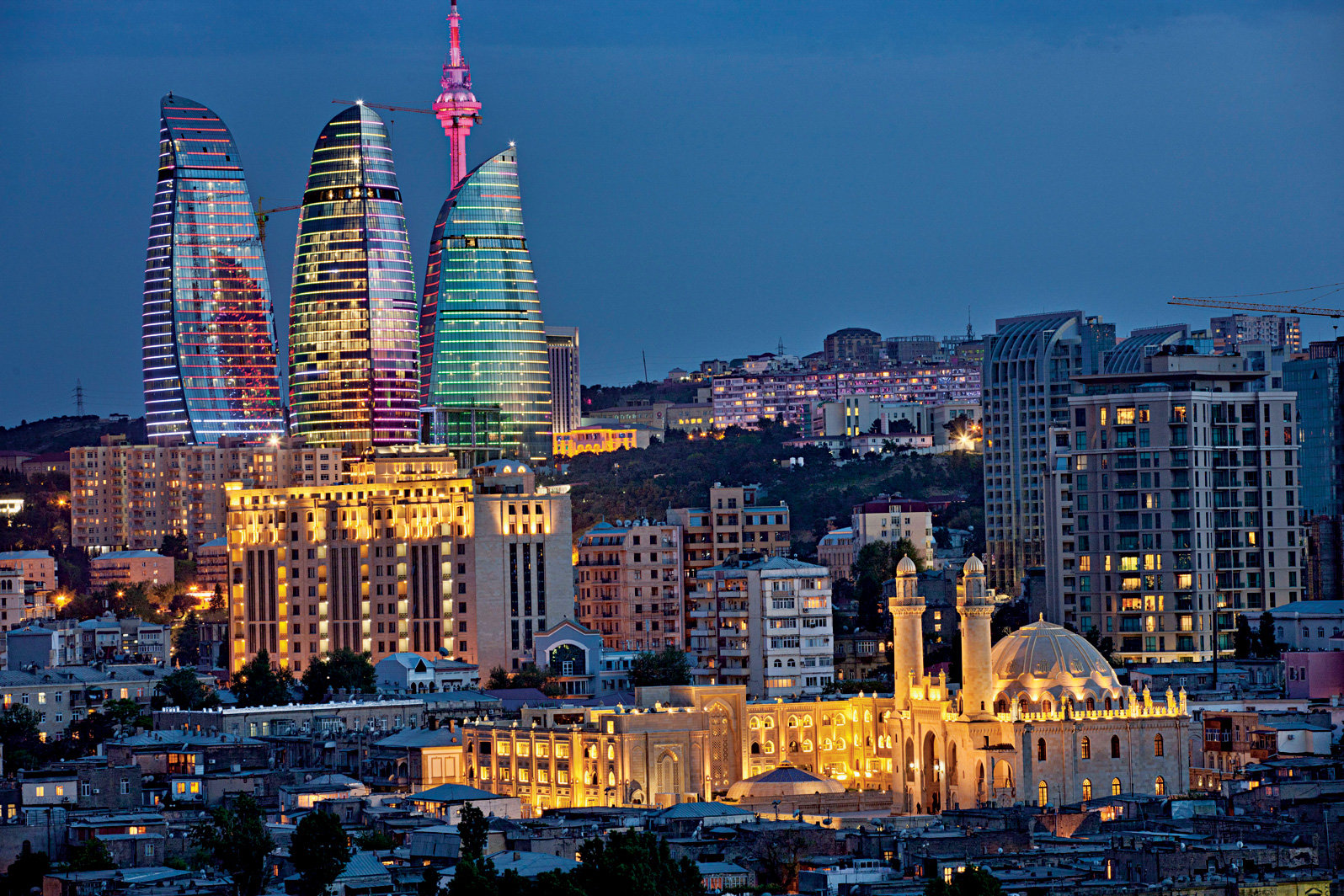
UNWTO 4th World Forum on Intercultural Dialogue concluded in Baku, Azerbaijani
Tourism ministers from around the globe this week went to Baku, Azerbaijan to attend the 4th World Forum on Intercultural Dialogue.
This meeting was not only important to listen to the Azerbaijan president, but it brought many candidates competing for the job of the Secretary General together one last time before the Executive Council meets in Madrid on May 12 to vote for the person able to lead World Tourism from 2018.
Azerbaijan is the chair of the upcoming Executive Council meeting.
Among candidates attending was Madam Dho Young-shim from Korea, Hon. Walter Mzembi from Zimbabwe (in photo) and Mr. Zurab Pololikashvili from Georgia who hadn’t been seen very often at other UNWTO events recently.

Current UNWTO Secretary General, Mr. Taleb Rifai had this to say when he addressed the audience in Baku:
We today heard important messages from Azerbaijani president”, Secretary-General, World Tourism Organization (UNWTO) Taleb Rifai said at the opening ceremony of the 4th World Forum on Intercultural Dialogue.
He noted that what happened in the past are repeated in the future: “As global leaders, we must head to tright direction in a single ship. We must provide freely traveling of the people. Today, the world faces hardships in several places. People must respect one another”.
He said that one out of 10 jobs is related to tourism: “Share of tourism will increase in the coming years. However, if we have authority, we also should bear responsibility. Movement of 1,800,000,000 people creates an opportunity for development of national economies”.
UNWTO Secretary General said that skills of the youths may improve by traveling to different places: “People get rich spiritually and know one another by traveling. Today, there is a lack of tolerance and understanding. People must unite and struggle against stereotypes. This year will be declared as a year of tourism. This allows us to unite our efforts. Global challenges may be eliminated through partnership. We must respect people, environment and we express self-respect by this. We’ll always travel to Azerbaijan. Azerbaijan is a nice place, Land of Fire. You have good people”.
Local children performed during the event.
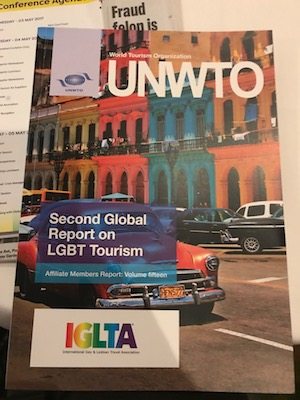
UNWTO and LGBT Tourism: Second Global report released at IGLTA Summit
Delegates and members of the International Gay and Lesbian Travel Associations are currently at the Rennaissance Hotel in St. Petersburg, Florida for their 2017 conference.
This morning the United Nations World Tourism Organization(UNWTO) and the International Gay & Lesbian Travel Association announced the release of the Second UNWTO Global Report on LGBT Tourism at IGLTA’s 34th Annual Global Convention in St. Petersburg, Florida. Five years after the publication of their inaugural collaboration, this edition takes a deeper look at current trends within this dynamic market segment.

Conference delegates received a copy of the report and were greeted with a video message of support from UNWTO Secretary-General Taleb Rifai. “LGBT tourism is a powerful vehicle for economic development. It also provides recognition to LGBT communities and gives destinations a reputation of acceptance, inclusion, and diversity that they deserve,” Rifai said. “Engaging with LGBT tourism is an important opportunity to raise awareness, and to raise our voice and stand against any form of discrimination in our sector, in our society and in our world.”
The Second UNWTO Global Report on LGBT Tourism discusses the relationship between rights for LGBT people around the world and the increasing visibility of LGBT consumers. It also looks at the trends that will be crucial to the development of the LGBT travel market in the future, such as the attitudes of millennials, increased global support for marriage equality and the willingness of new destinations to welcome LGBT visitors. It features case studies from UNWTO Affiliate Members, IGLTA members and other specialists in the field of tourism marketing and development.
Since the publication of the first edition of this report in 2012, significant progress has been made in countries around the world toward securing equal rights for LGBT people, and where the rights of local LGBT people are respected, LGBT travelers will feel safe and welcome. The Second Global Report on LGBT Tourism explores future opportunities for growth among emerging outbound markets and offers practical guidance for both established LGBT businesses that want to remain competitive and those just entering the market.
“Today, authenticity and consistency matter to consumers more than ever before, so LGBT marketing must be much deeper, more authentic and consistent,” said IGLTA President/CEO John Tanzella. “We are proud to collaborate with the UNWTO to help the global marketplace better understand LGBT tourism, and with the support of our IGLTA Foundation, will continue to fund research that furthers this conversation worldwide.”
This report was made possible with funding from the IGLTA Foundation and the Greater Fort Lauderdale Convention and Visitors Bureau. To download a copy of the report, please visit iglta.org/unwto-report/
The International Gay & Lesbian Travel Association is the leading member-based global organization dedicated to LGBTQ tourism and a proud Affiliate Member of the United Nations World Tourism Organization. IGLTA’s mission is to provide information and resources for LGBTQ travelers and expand LGBTQ tourism globally by demonstrating its significant social and economic impact. The association’s membership includes LGBTQ and LGBTQ-friendly accommodations, destinations, service providers, travel agents, tour operators, events and travel media in 70 countries In 2012, the philanthropic IGLTA Foundation was launched to support the mission of the association and its membership through education, research and leadership development. For more information, please visit iglta.org or iglta.org/foundation and follow us on social media @IGLTA or the IGLTA Foundation Facebook page.
eTurboNews is a proud member of IGLTA and attending the event.
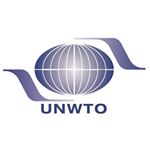
UNWTO Secretary-General thanks outgoing WTTC President for strong partnership
UNWTO Secretary-General, Taleb Rifai, has expressed his sincere appreciation to David Scowsill, President and CEO of the World Travel & Tourism Council (WTTC) for the strong partnership between both organizations as he announced his departure after six years at the helm of WTTC.
Over the last six years, UNWTO and WTTC have created a strong partnership, bringing public and private sector together to advance the tourism sector and addressing its most pressing priorities.
UNWTO and WTTC Open Letter on Travel and Tourism Initiative launched in 2011 garnered the support of over 80 Heads of State and Government from around the world. With this initiative, UNWTO and WTTC aim to promote the importance of the tourism sector in socio-economic inclusive development at the highest level.
“I could not have asked for a better partner. It has been a privilege to work alongside David to mainstream our sector in the global agenda and ensure public and private sector do work together for a better future” said UNWTO Secretary-General, Taleb Rifai.
“During his time at WTTC, David has showed unparalleled leadership and vision, championing public/private sector collaboration and promoting the sustainable growth of our sector. As founder and Chairman of the Global Travel Association Coalition (GTAC), an initiative to ensure the sector can speak with “One Voice” on the key issues such as safe and seamless travel or sustainability, David has united the sector like never before” he added.
Mr Scowsill future plans include joining boards of companies around the world and providing strategic advice to governments.

14th UNWTO Awards for Excellence and Innovation in Tourism : Call for applications
Applications for the 14th edition of the UNWTO Awards for Excellence and Innovation in Tourism by the World Tourism Organization are now being accepted. Winners will be announced in January 2018 on the occasion of the UNWTO Awards Ceremony, to be held at the International Tourism Fair in Spain (FITUR).
Applications for the UNWTO Awards span four categories: Public Policy and Governance; Enterprises; Non-Governmental Organizations, and Research and Technology.
Since their creation in 2003, the UNWTO Awards for Excellence and Innovation in Tourism recognize the work of organizations and individuals around the world that contribute to foster innovation in tourism and build a more sustainable and responsible sector.
Interested parties are encouraged to apply before 30 September 2017. Additional information and application documents can be found at: http://know.unwto.org/14th-unwto-awards-apply
Relevant dates:
3 May 2017 Call for applications
30 September 2017 Deadline for reception of applications
First week of November Announcement of Awardees
15 January 2018 14th UNWTO Awards Forum
17 January 2018 14th UNWTO Awards Ceremony & Gala Dinner

The 3th UNWTO International Congress on Ethics presents the Recommendations on the Responsible Use of Ratings and Reviews
Tourism stakeholders have convened in Krakow, Poland, in the 3th World Tourism Organization International Congress on Ethics to underline the need to continue advancing the ethical framework of the sector. The event, which was conducted on 26-28 April, is one of the pillars of the ‘Enhancing the Understanding of European Tourism’ Project, implemented by UNWTO in cooperation with the European Commission.
The Krakow Conference has served to present the UNWTO Recommendations on the Responsible Use of Ratings and Reviews on digital platforms. The guidelines were developed by the World Committee on Tourism Ethics (WCTE) with the collaboration of TripAdvisor, Minube and Yelp.
“Online ratings and reviews are now playing a major role in tourism. The purpose of these new recommendations by the World Committee on Tourism Ethics is to ensure that all actors are playing fair and transparent.” Said Pascal Lamy, Chair of the World Committee on Tourism Ethics.
“The UNWTO Recommendations on the responsible use of ratings and reviews on digital platforms are a groundbreaking work resulting from a strong partnership and engagement of TripAdvisor, Minube and Yelp. We know that ratings and reviews are today critical for consumer decisions and UNWTO and the World Committee on Tourism Ethics could not have advanced this important work without them,” said UNWTO Secretary-General Taleb Rifai.
On the same occasion TripAdvisor has signed the Private Sector Commitment to the UNWTO Global Code of Ethics for Tourism. In the last years, TripAdvisor has become the largest site of travel-related content with more than 500 million of traveler reviews. The incorporation of TripAdvisor to the signatories of the UNWTO Global Code of Ethics for Tourism enhances the potential of this non-binding document which is the major guidance global text on responsible tourism.
The Global Code of Ethics for Tourism (GCET) is a comprehensive set of principles designed to guide key-players in tourism development. Addressed to governments, the travel industry, communities and tourists alike, it aims to help maximize the sector’s benefits while minimizing its potentially negative impact on the environment, cultural heritage and societies across the globe.
Adopted in 1999 by the General Assembly of the World Tourism Organization, its acknowledgement by the United Nations two years later expressly encouraged UNWTO to promote the effective follow-up of its provisions. Although not legally binding at this stage, the Code features a voluntary implementation mechanism through its recognition of the role of the World Committee on Tourism Ethics (WCTE), to which stakeholders may refer matters concerning the application and interpretation of the document.
Since 2011 a total of 513 companies and associations from 69 countries have adhered to the Private Sector Commitment to the Code, pledging to promote and implement its principles and report the actions taken in that respect to UNWTO on a regular basis.

Tourism stakeholders gather to support the development of the Western Silk Road
The city of Alexandroupoli, in Greece, has hosted the 1st International UNWTO Western Silk Road Workshop held on 26-27 April 2017. The event was jointly organized by UNWTO, the Ministry of Tourism of Greece and the region of Eastern Macedonia and Thrace. The workshop is the first practical step of an initiative, developed by UNWTO in cooperation with the European Commission as part of the ‘Enhancing the Understanding of European Tourism’ Project.
The Western Silk Road Tourism Development Initiative aims to revive and redefine Silk Road heritage located throughout the European or Western section of the historic Silk Road routes. By involving many different partners throughout Europe, this novel initiative aims to strengthen and diversify the tourism offer of Western Silk Road destinations as well as enhance regional cooperation and cross-border partnerships.
Three panels integrated the Workshop that focused on the challenges and opportunities to develop the Western Silk Road as a trans-national tourism route, on the marketing potential of the Route, and on the practical steps needed to be taken in order to ensure the project’s long-term success and viability. As part of the discussions, a Western Silk Road Work Group has been established in charge of guaranteeing a coordinated approach.
As expressed by UNWTO Secretary-General, Taleb Rifai, “in present times, and building upon a natural and cultural wealth spanning thousands of years, we are in a position to reject harmful global tendencies and revive a route capable of transforming the way we think about and relate to travel. I can think of no better place to host an event focused on European Silk Road heritage than Greece – rightly considered one of the cradles of Humanity”.
Tourism unites people and nations. It promotes stability, peace and growth. It builds bridges of cooperation and opens-up roads to prosperity. Thus, we are pleased to support the organization of the first international workshop, as part of this excellent Western Silk Road initiative,” mentioned the Minister of Tourism of Greece, Elena Kountoura, at the Opening of the Workshop. “.”
Attended by the Governor of Eastern Macedonia and Thrace, the Mayor of Alexandroupoli and the Secretary-General of the Greek National Tourism Organization, the Workshop counted upon excellent feedback from a wide range of international stakeholders from the tourism sector and beyond, including tour operators, universities, cultural route representatives and stakeholders from the creative arts, such as the Silk Road Folklore Dance Festival and the Silk Road Film Festival.
Important input was also contributed by UNWTO Affiliate Members, TripAdvisor, Destination Makers, the Fundación Turismo Valencia, the World Federation of Tourist Guides Association (WFTGA), the Greek Guiding Association and the Ministry of Culture and Tourism of Iraq, that addressed the potential of cultural and religious tourism.
Aegean Airlines, who shared its actions in promoting route development and connectivity across the Silk Road, the Chamber of Evros and the Tsiakiris Silkhouse supported the event.
The conclusions of the Workshop will be further concretized at the 2nd International Western Silk Road Workshop, which will take place in Bulgaria at the end of June 2017.
